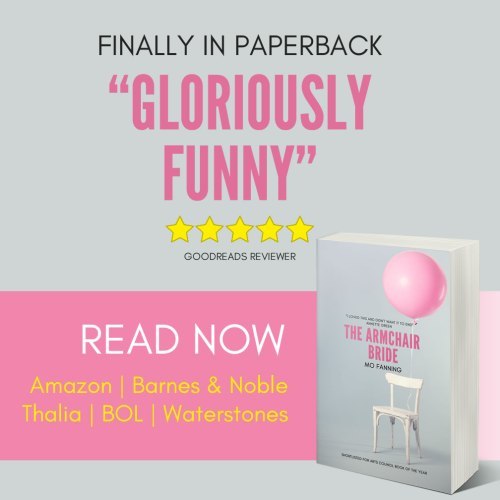Mo Fanning's Blog, page 17
January 8, 2019
Writing tips: Timeless time
Trends come and go. What’s in today is gone tomorrow. These are not so much writing tips as lessons I learned … the hard way.
In the traditional publishing world, life moves slowly. Two years often pass between when you type ‘The End’ and when you get to see your book for sale. Even if you self-publish, six months often fly by as you self-edit, pay a professional to tell you what’s wrong and make everything right.
I first published The Armchair Bride in 2008. When revising the story for recent republication (available now from all good booksellers), I found my world littered with period detail. The main character often checked her email in an internet café. She used a fax machine and a Blackberry. She had to find a place to plug in her laptop (tablets and smart phones were the expensive stuff of dreams). My characters wore bleached denim, drank alcopops and smoked in bars. In one surreal scene, a train left Manchester on time.
Timeless writing tips
It’s easy enough to avoid pitfalls. Here are five writing tips to consider as you tackle any work in progress.

Technology – Stay generic. This very morning, Alexa woke me. I read headlines on my iPad. I told Nest to turn up the heat. Someday, we’ll get the rubber self-parking cars promised back in the 70s by BBC’s Tomorrow’s World.
Websites – Apart from corporate lawyers who get twitchy about brand abuse, there’s a good chance of any website vanishing overnight. In the first draft of The Armchair Bride, Lisa used Ask Jeeves. Don’t rely on Google, Tinder or Uber to be around tomorrow. Have your characters ‘search online’, ‘scan a dating app’ or ‘fish out their phone and hail a cab’.
Politics – It’s an effective way to frame a world or the mood of a nation in which to set stories. If your tale needs to exist in a specific time, you’re on safe ground. Even so, avoid throwaway name-checks for Brexit, UKIP, Corbyn, Trump or May. By the time you publish, they’ll sound hacky.
Celebs – Much the same as politicians, they’ll be forgotten tomorrow. That’s showbusiness. Reality show winners enjoy a limited shelf life. A good writer creates a (thinly disguised) version of their target.
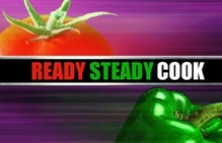
Television/Film/Theatre – With streaming TV, short attention spans and big studios remaking classics, it’s best to avoid specifics. Ready, Steady, Cook was huge. Today it’s Bake Off. In two years … who knows?
Cities and towns change. Shops shut down. Newspapers and magazines vanish from the stands. Trends become deeply untrendy. National treasures blot their copybooks.
Find ways to make your fiction timeless.
The post Writing tips: Timeless time appeared first on Mo Fanning.
December 31, 2018
My top six books of 2018
I’ve read many books this year. I toyed with picking my top five just before the tree went up, and then my pedantic partner pointed out two weeks remained of the year. I could easily read a book or two more. And he was right. I did. One absolutely dire (it’s topping best seller lists even now), the other a zinger and featured below.
As you read this, I’ll be ironing my pyjamas and checking every few minutes we’ve enough milk, given the shops might shut tomorrow. It’s anti-party central at the Fanning home. I might even find my first book for next year.
Scroll to the end of this list for a few festive offerings from me.
Six titles really stuck in my mind this year, and I’d like to recommend them if you’re shopping around for something to read while Jools Holland keeps his mates in appearance fees. Keep in mind, I’m (un)fashionably late to any party, so none of these are likely to be found on the hot new title displays in your local bookshop.
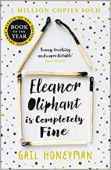 Elinor Oliphant is completely fine – Gail Honeyman
Elinor Oliphant is completely fine – Gail HoneymanI’d heard so much about Gail’s debut novel. Not only did it win dusty fusty awards, but normal people seemed to like it too – and rarely do the two things happen. It’s while since I found myself gripped from the first chapter. When I found Elinor, I was struggling to finish any book. I’d been through the old cancer thing and convinced myself the drugs pumped into me would lead my mind giving up the ghost. (And yes, I do tend to grandstand the personal anguish). Gail Honeyman wrote a book that kicked my reading head back into shape and for that I can never thank her enough. Elinor is a fascinating woman. I see a lot of workplace me in her. Watching her evolve from someone bewildered by the sudden speed and impersonal conventions of society into someone who finds her way to fit in proved fascinating. I could cringe with recognition one minute, be angry with her (and me) the next and then disarmed by her kindness. This is a rare book. I’d take it to any desert island. And so should you.
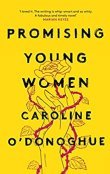 Promising young women – Caroline O’Donoghue
Promising young women – Caroline O’DonoghueThe opening chapters suggested this to be a light and frothy slice of women’s commercial fiction. Well-written but not one I’d remember. Because I didn’t bother with Caroline’s supporting interviews or think pieces, I was in no way prepared for the depths the story plumbed as more layers of dignity were ripped from Jane Peters. I don’t want to spoil things for anyone, so I won’t reveal more, but ‘Promising Young Women’ swings from one place to another with no hint of a warning. And my feelings for Jane changed too. This book kept me awake late at night, promising myself one more chapter. I can’t wait for what Caroline does next.
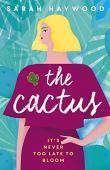 The cactus – Sarah Haywood
The cactus – Sarah HaywoodI sort of held off on this one, feeling it might be too much like Elinor Oliphant, and in doing so, nearly missed out on adding this to my year-end list. Susan Green isn’t your typical cat hair, furry booted crotchety office knitter. She doesn’t even seem to know who she is or how she fits in. There’s intrigue in knowing who put such an old and careful head on these shoulders. As prickly as you might expect from the title, it’s only when something in her life gradually becomes tangible, that the walls shift. And the ending packs a powerful but satisfying punch.
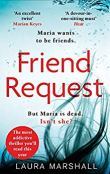 Friend request – Laura Marshall
Friend request – Laura MarshallThis title was already past its hype period when someone told me I had to read it. The period detail was spot on and stirred in me visceral hate for social media as it turned the torch on the damage caused by childhood bullies. Add in a cracking whodunnit story line and you’ve something that’s hard to put down. Despite the raw subject matter, Laura’s writing stayed warm and entirely accessible. The ending felt satisfying – if a teeny tiny bit over-signposted. It’s a quick read, but well worth your while. Laura’s new book actually came out this year and it’s on my ‘to read’ list for 2019.
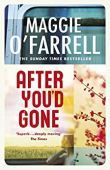 After you’d gone – Maggie O’Farrell
After you’d gone – Maggie O’FarrellThis is one of the oldest books I picked up this year. I’d heard of Maggie, but never quite found the time or space to read her. Thanks to the literary awards piled on her plate, I suspected I might find her words overwrought. ‘After you’d gone’ is a stark and incredible read. I raced through it unable to stop. I went on and read ‘My lover’s lover’ right after and found it a huge letdown, but it won’t put me off reading more from her. In fact I already dipped my toe in ‘Esme Lennox” (that sounded better in my head than it does now) and it’s the next cab off my reading rank.
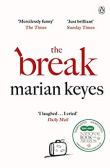
The Break – Marian Keyes
There’s something so dependable about any book by Marian Keyes. Before I pick it up, I know I’ll identify with at least one of her characters. I know I’ll smile. I suspect at some point I’ll be thrown by the depths of despair that rises from an otherwise ordinary event. ‘The Break’ didn’t disappoint. If anything, it’s one of her strongest tales. Beautifully written, with characters that used a new economy of words – but don’t worry that doesn’t make it feel any the less Marian. She might not pump the books out so much these days, but every title is worth the wait. Why isn’t she compulsory reading at every school in every land?
Festive offers
I’ve got my Santa hat on and I’ve not shaved since the middle of December – and at my age that means grey/white stubble, so I’m of a mind to give things away and flog stuff cheap. If you’re reading this on New Year’s Eve, get ready for a FREE Kindle download of ‘This is (not) America‘ – my first short story collection. It’s available at no cost for five days starting at midnight PST on 31 December 2018 (you do the math, I’m rubbish with time zones).
Because there’s a good chance I’ll have my new book ready for you to read in 2019, I thought I might remind you how it all started, and I’ve reduced the price of ‘The Armchair Bride‘ to 99 shining new pence (or cents if you happen to be that way inclined). Regular readers will know I updated parts of the story to remove internet cafes and fax machines a few years back, so it has new gloss. Treat yourself. You’ll make me and you very happy.
The post My top six books of 2018 appeared first on Mo Fanning.
December 24, 2018
That was the year that was
Around about this time last year, I decided to scratch a personal itch – and that does indeed sound like something best discussed with a doctor.
2018 was to be different. It would be my year of saying yes.
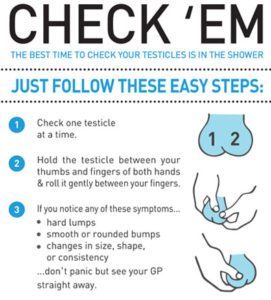
How to check for Testicular Cancer
I reckoned without my Valentine’s Day discovery. Chances are, I’m not the first to find something untoward about a scrotum whilst in the Premier Inn, Warrington. It kicked off a roller-coaster month confirming how important it is to defend the NHS. Two weeks after calling my GP and trying to describe my malformed testes, someone wheeled me into an operating theatre. Three weeks later, I experienced my first session of chemotherapy. Nine months later, I’m in recovery. And – frankly – boring the arse off anyone who’ll listen about how important it is to self examine. Be it breasts or balls, you’ll save yourself an awful lot of nastiness by spending a few minutes every few weeks checking for lumps, bumps and unwelcome hardness.
I reckoned without finding myself unable to write another word of a book I hoped to see on many a Christmas wish list by now. I’d managed a first draft – enough to elicit a decent structural edit, but that was where I stopped. Three or four attempts to resurrect the flow failed, but I know I’m not done with the story. The focus has changed. It feels darker and that calls for a different approach. 2019 will be my year of writing. ‘The Toast of Brighton’ will appear.

Jill Edwards Course Mates
I reckoned without Jill Edwards and a bunch of people I now consider friends. Twelve stand-up comedy classes opened my eyes to a whole new world. Standing on stage in front of over 200 people was a rush. When they laughed … and even clapped … it felt incredible to talk about Stourbridge, my mother and feeling like the wide-headed square peg in a hipster round hole. After much hesitation, I signed up up for Jill’s ‘advanced workshops’. I’ve met some wonderful people. If you ever think of doing this, don’t think twice.
I reckoned without falling back in love with New York. After years of doing a job that involved too much travel, I decided to avoid airports. The odd trip home to Amsterdam, sure, but that would be it. And then this year, Mr Fanning suggested we bite the bullet and fly to New York. I’d forgotten how much I love the place. How the atmosphere is so very different to that in any European city. People don’t stare only at smart phones. They walk and talk. The streets are dirty enough to feel real. It makes no concession to tourists. Even in these troubled times of Trump, New York radiates hope. Ten years ago, I’d pack a bag and move there.
The post That was the year that was appeared first on Mo Fanning.
December 6, 2018
A new addiction
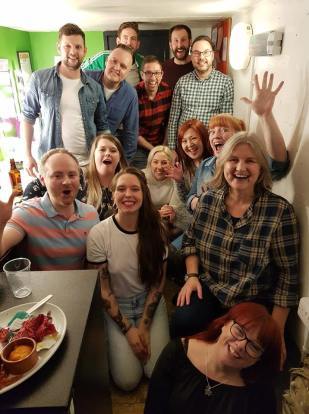
Jill Edwards Course Mates
I’ve a new addiction. In its purest form, it’s a need for attention.
That stand-up comedy course I did … I want to do more. On Tuesday evening, along with 11 other terrified first-time comics, I waited backstage at the Komedia in Brighton, as nearly 300 people took their seats.
Our ‘New Act Night’ marked the end of a twelve-week course where I put myself in the very capable hands of Jill Edwards.
She doesn’t suffer fools gladly. On occasions, she scared me. Her rules didn’t always make sense … at first. But she made a solemn promise in that first lesson – “If you follow my instruction, listen to feedback, take on board what I’m telling you, I’ll put you on stage and people will laugh.”
She didn’t break her promise.
Every one of those twelve weeks were – as they say on every tired talent show – a journey. My emotions veered from sheer frustration through to the joy of nailing a performance. When the audience laughed (and at one point applauded one of my jokes), I was stunned.
And more than that, I’ve made new friends. People I care about deeply.
So … how to deal with this addiction?
For weeks, I couldn’t decide whether to bite the bullet and join Jill’s advanced comedy workshop. At one point, it looked like that decision was taken for me when I wasn’t invited. But that turned out to be a technology glitch. Of course, the second my money cleared, I changed my mind.
But after Tuesday evening, I changed it back.
Now I can’t wait!
If you fancy giving stand-up comedy a go, visit Jill’s website.
The post A new addiction appeared first on Mo Fanning.
December 5, 2018
Cop a feel for Christmas
I forgot about the cancer thing. Over the last three months, I managed to pack away the worries into some sort of personal attic. I even stopped playing the cancer card to win refunds from unwilling websites – the outcome being our back room now has a corner dedicated to clothes that will never fit and technology that doesn’t quite do I decided it promised.
It’s a New Year’s resolution waiting to happen.
And then, I found myself once more with my trousers round my ankles. A young guy with a beard told me to lie down, and it all came back to me. With a jolt.
… I was having my annual CT scan, for avoidance of doubt.
The truly brilliant thing about having treatment for cancer (go with me on this) is the surveillance. My demographic (men in their 50s, overly fond of the sofa) is prone to ignore anything but an actual limb actually hanging off. If we think we’ve found a lump, bump or anything untoward, we’ll rarely endure the deep psychological trauma of waiting for someone to answer the phone and grant access to a GP. The thought of being asked to bend over and cough fills us with dread.
But that saves lives.
My recent battery of tests – bloods, scans, health questionnaires – confirmed when the shock of having cancer dims, a team of professionals does their best to stop it happening twice. And if luck isn’t on my side and it does, they’re there at the start … when the problem involves nothing more than a few rogue cells.
I’m nine months into ten years of ‘surveillance’. The word sounds ugly, but ‘cancer’ itself won’t win any beauty contest. There’s comfort in knowing that someone who knows what to look for will keep an eye on my insides.
If you haven’t done your monthly inspection, start now. Don’t kid yourself that testicular cancer only hits younger men. There’s another statistical spike around the age of 50.
Unlike Tinder users, cancer doesn’t discriminate.
Cop a feel for Christmas.
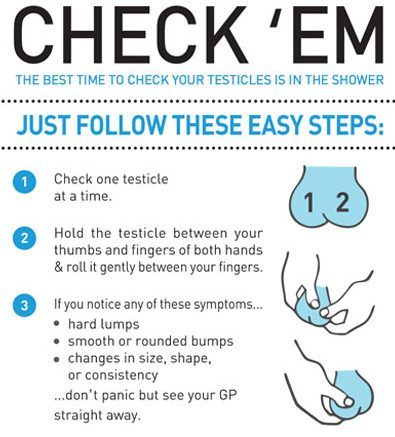
How to check for Testicular Cancer
The post Cop a feel for Christmas appeared first on Mo Fanning.
November 23, 2018
My latest excuse for not writing
One of the first things I learned when I started to write remains the most effective. When done with a draft, put it away. Lay down your words to rest for at least a month. Two if you can. Three is better.
When I received editorial notes back in September, my first impulse was to crack on with my work-in-progress. I’d already left it alone for three weeks while she worked her editorial magic. Her key suggestion was to start the story at a different point.
Confession: Even though I know the rules, I started work immediately.
Admission: The rules exist for a reason.
A twist of fate saved me from myself. I’d forgotten a new year pledge to try my hand at stand-up comedy. An email reminder set me right. It never crossed my mind that writing a three-minute stand-up set would be so all-consuming.
My ‘work in progress’ novel went ignored. I found it impossible to switch my writing brain from stand-up to novel mode. One demands a choppy rhythm and economy of words. The jokes come first. The other must flow, draw pictures, tell stories. The jokes come second.
With my comedy dalliance near its end, I’ve decided to try something else new and I’ve signed up for a screenwriting course. A note from my editor suggested I cull minor characters. I feel learning to write for a smaller canvas might force me to focus.
If it’s anything like stand-up, my next book will stay under wraps until 2020. At the earliest.
Shamless plug
If you happen to be in Brighton on 4 December, please come along and support the wonderful people with whom I’ve shared three fabulous months of Saturday afternoons.
The post My latest excuse for not writing appeared first on Mo Fanning.
November 4, 2018
Learning to write again – the world of standup comedy
It took years to reach a point where I believe my writing reflects ‘my voice’. There is a rhythm, and the words flow in a certain way. An attitude lives on the page.
It wasn’t always so. I’ve made all the rookie mistakes … joined peer groups and reacted to each and every suggestion (writing by committee), punkishly failed to break convention, edited as I write, failed to plan. I’ve done them all, and more.
Learning to work with a structural editor is tough. The bad ones rewrite. The good ones dig into pace and structure, and make scant reference to actual words. The end result must still sound like me. People buy my books. Not stories written by an editor.
This isn’t how things work in standup.
Stop telling stories
Being told to lose the self from my words is anathema to me. I’ve spent more than ten years finding ways to tell stories with the fewest words possible. Often, by the time I get up on stage in comedy class, what’s in my hands has been through hours of honing.
When my teacher crosses out words because I’m ‘telling a story’, I want to argue that this is what I do. I make money by telling stories.
Every comedy class handout stresses how standup needs to be about the person on stage. It has to stay true to the performer. Otherwise, the comic becomes a hack … what my teacher calls – with a roll of the eyes and ample derision – ‘another new act’.
As a group of students we are told to be themselves, not someone else. But the handful of words that survive a classroom edit no longer sound like me. I’m not allowed to tell stories.
It leaves me asking if standup is something I can do … at its very basic level.
Choppy
The point my teacher labours is that standup relies on a choppy rhythm. The audience needs to read an act as comedy. My lines must form themselves into (short) setup and punch.
Nobody talks like that in real life, but authenticity is not the objective. Standup works like poetry. It has meter and rhyme. It’s choppy, choppy, choppy.
In TV and film, (first world) horror stories abound of scriptwriters who turn in work, only to have teams tear apart and reassemble perfect prose into lines they no longer recognise. The writer’s contribution amounts to little more than an occasional turn of phrase. A persistent idea now voiced by others. That’s what happens in comedy class. I become my own creative consultant.
Everything that passes muster – the dozen or so gags permitted airtime in my three-minute set – will have been through many iterations. I’ll have read the wordy mess out loud, cut each line that didn’t land with a laugh. I’ll have been told which words to lose and had my beautiful authentic-sounding sentences shredded. I’ll have read it again, and tried to get behind something that I no longer find funny. I nod again as more invited edits contradict previous cuts. My teacher reduces carefully crafted pictures into lifeless iambic pentameter.
Clone zone
I detest what remains, but at the same time find the process fascinating. There are times when I feel like giving up in frustration … and that reminds me of when I first learned how to write stories. The challenge this time is not to write for readers. It’s to get up on stage and breathe life into dead words. A different skill set.
What I fear most is sounding like a clone. Having thrown myself into things and hung around new comedy nights throughout this three-month process, I’ve developed an ear for performers who come from the same factory. Would I want to market the end result under my name when I don’t feel connected to what remains?
As a novelist, such an approach would get me nowhere. But in this new world of standup, it seems to be expected. A fellow student noted our education is like learning to drive. The rituals and rules exist to make us safe and competent drivers. It’s only after passing that we get to cross over our hands and develop our style.
I’m left having to ask if this is for me. I’ve enjoyed doing something different, and pushing myself to face a fear. The company along the way has been most agreeable, but it’s played havoc with my writing.
There remains one last hurdle. An audition to perform live at the course showcase. Right up until I added my name to the list, I was sure I wasn’t going to bother, but now …
It won’t sound like me. The words are not truly mine, but I might as well see this through.
The post Learning to write again – the world of standup comedy appeared first on Mo Fanning.
October 29, 2018
The hardest thing about writing
I write. It’s my paying day job, the way I fill the downtime hours and I’ve upped the pressure by telling myself I have it in me to be funny. On a stage. In front of strangers.
Writing isn’t tough. Making it any good is more like work, but again, not beyond reach. What has proven harder is knuckling down and doing it in the first place.
At the other end of the summer, I fired off a (seventh) draft of what I hope will become my next novel to an editor. It came back with notes and (much as expected) suggestions of how to make it better. Inspired, I set to work, and then the usual thing happened … I found other ways to fill my time. Excuses. Reasons not to write. Show me a writer who doesn’t procrastinate and I’ll show you a pair of pants on fire.
Loving the work
It’s weird … because when I write, I lose myself. What was meant to be toil, turns into eight happy hours wrapped in my world. I love what makes the page. When dragged from the screen by Mr Fanning, I’m wide-eyed with wonder, keen to tell him how this time I’ve cracked it. My new book will win awards.
The next chapter – the one I’m doing my best to avoid – is the ‘turning point’. The exciting bit (for a writer) where you turn the story on its head and move into ‘the controlled landing phase’. The part where I get to draw together multiple threads and land the plane.
As always, it’s easier to polish existing chapters. Rewriting dialogue, picking a better word, fixing faults. Editing on the fly is how writers fail. It’s how they fail to finish. How they fail to get published. How they fail to be writers. I know all of this, but it’s a habit I find hard to break.
Only when you’ve completed a first draft should you look back. Until then, you write. You accept it’s not your best work and allow for plot holes and poor turns of phrase. You accept it’s not even funny. Or plausible. There’s time to tackle this later.
Standup
Writing standup comedy seems to be much the same. There’s huge temptation to edit the life out of what I’ve written. Just as with a novel, I’m learning that I need to keep going until I reach ‘the end’. I’ve been taught to ‘rant’ about my chosen topic into a recording device with my conscious mind turned down low. It’s only by doing this that any ‘comedy brain’ gets to take over and produce a ‘left turn’. It might lead to one rough pebble in a bag of grit, but that’s all I need. At the end of my course, I’ll have three minutes of comedy to perform. Twelve jokes at most.
It seems that with any sort of writing, until you’ve done the groundwork, it isn’t worth your time. Perfection isn’t part of it. That comes with editing. Without a complete train of thought, you’re lost.
I suppose the hardest thing about writing isn’t starting something. It’s finishing it.
The post The hardest thing about writing appeared first on Mo Fanning.
October 18, 2018
Cock gags and knuckling down to standup
I sat and listened to a standup comic tell jokes about his penis and wondered who hurt him. It was a night of new comedy, and I was there to be supportive. The hope at these shows is for gold to glisten … but this was as far away from funny as I’ve been in a long time.
From telling the audience that the male penis (his words not mine) is hard to control – and this is true when you’re a 14-year-old boy on a bone shaker bus – to claiming men always get erections when they hurt themselves, his routine failed to root itself in truth … and told me nothing of the storyteller. He ended with a skit on how men can (it seems) thrust their unpredictable penises at women in nightclubs with impunity and yet we frown on such behaviour in supermarket queues. It was hard to clap support.
What depressed me more was that this standup set came after a more experienced comic ‘fucked’ and ‘twatted’ his way through a ‘set’ that also involved thrusting his groin at a woman in the front row (along with an athletic tongue waggle), ending on a joke about how when his manager asked if there were ‘any queries in his office’, his shiningly witty response was: ‘I told him, this is 2018, you have to call them homosexuals.’
Frank Carson spun in his grave – or urn – who am I to make assumptions?
Learning to standup
I’m in week six (the halfway point) of an absolute beginners standup comedy course and if any of my fellow novices dared churn out such lines, our take no crap tutor would throw us from the stage.
It’s not like I think comedy has to be bland and take no risk. If something is funny, it’s funny. During a post-course pint, one guy on the course told me how he wanted to tell jokes that didn’t need him to swear. It’s weird that this will make him stand out – he’s lucky in that he’s funny though, but when did writers get so lazy that ‘fuck’ became the go-to filler word?
I don’t expect every comic to be the same. Back to that new comedy evening, and a later act recalled how her father took on elderly rescue dogs that promptly died. He buried them around her Wendy house … just not deep enough. Grim, but a line that spoke so much more about the person on stage.
#amwriting
My novel writing needs me to knuckle down and focus. The comedy course has my creative brain fixed on creating a three-minute set by the start of December. So far, I have next to nothing deemed close to acceptable. This means each spare minute finds me generating material, hoping for a quantity not quality result. I’ve applied my first rule of writing: when drafting an 80k word novel, at a conservative estimate it means writing four to five times that amount. When the first draft has sat in a digital box for a month or two, I resume the task. This means I cut, kill, revert, scrap and reset ideas. The same obsessive word smithery must surely apply to standup.
Toast of Brighton lies in pieces – crumbs and slices, if you will. As time allows, I reassemble, confident I have a big enough pot of glue for final this almost final edit. With a hugely significant December 30 deadline, I need to knuckle down.
I’m midway through redrafting a big chapter. One where a key character dives from a forbidden bed with his engorged member flapping. After the other night, this image has lost its comic shine. For that alone, I must thank that young male comic whose first standup gasps left me otherwise cold.
It’s all writing. It’s all words.
The post Cock gags and knuckling down to standup appeared first on Mo Fanning.
October 7, 2018
High anxiety
This has been a difficult week. Is something hanging in the air? Out of the otherwise blue came a crippling anxiety attack as Friday progressed, spurred on by the slow shift to the dead-leaf mellow mists of autumn. All at once I found myself unable for things, gripped by ‘the fear’ and desperate to hide away.
I’d tickets to a comedy club, and that ruled out lurking behind closed doors … after all, this is my ‘year of saying yes‘. By design, there will be days like this.
And so, I spent Friday evening with my feet stuck to a carpet in a room that resembled the scene of a violent crime with sixteen other people, most of whom had shown up to perform. One of the guys terrified me, one of the women is clearly destined for ‘Live at the Apollo’.
Saturday dawned, I opened one eye, breathed deep and hoped for the best. Was it over? No. Still the fear held me in its grip. Less able than ever, I forced myself to get dressed and show up at comedy class. The misery-soaked three hours felt like the seventh circle of hell as every sinew strained to keep me from bolting for the door. I stumbled through – unharmed, albeit with self-confidence gutted.
Drop out
I came home dejected, sure that week four of twelve would be my last. Determined to see a half-full glass, I told myself I should be proud to have managed a quarter of the course. I signed up knowing it would terrify me, and yet I love the people, the supportive atmosphere and how my wonderful tutor tries so hard to make me trust her process. I fear she’s fighting a losing battle. Someone who writes like I write – someone addicted to story telling – will always struggle to jump tracks.
And while I‘ve your attention, here’s a tip. If your head hammers with anxiety, avoid any on-line interviews with ‘heartbroken vets explaining the need to be with your dying dog at the end’. I spent two solid hours sobbing in the dark.
Recovery
For today, I’m playing things safe, and refusing to leave my bed.
Fellow cancer sufferers warned me these crashes land in waves. The roller-coaster of ‘remission and recovery’ is as devastating as diagnosis and treatment. Until I got close to this vile and cruel disease, I’d assumed when the doctor announced you were getting better, your spirits would soar. And now, I accept the need to permit despair. But also, that despair isn’t necessarily a bad thing.
Writing
I’ve a book to finish writing. A romantic comedy – and being so unable for the world is poor form. Sure enough, the editorial feedback left me daunted, but I’ve sifted through what I want to take on board. I’m halfway through what reads like a solid draft … and with three more months to the deadline, I’ll make it. I’m sure.
No matter how crap the last few days, I don’t want to stop myself saying yes.
The post High anxiety appeared first on Mo Fanning.




